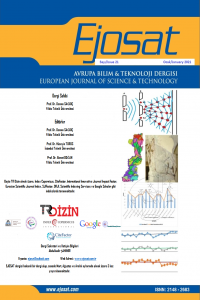Abstract
Birbirinden farklı interpolasyon noktalarında (veya nodlarında) verilen datalar kullanılarak, polinom interpolasyon problemi monomial bazlar ile fade edilebilir. Bu ifade, Vandermonde matrisi ile beraber bir lineer denklem sistemi oluşturur. Reel sayılarda verilen interpolasyon noktaları için bu noktaların sayısı çok küçük değilse; Vandermonde matrisi genel olarak kötü durumludur ve bu kötü durumluluk bu matris ile çalışmanın zorluklarından biridir. Bu kötü durumluluğun derecesi, interpolasyon noktalarının dağılımına bağlı olarak epeyce farklılık gösterebilir. Bu bağlamda, noktalarının dağılımı eşit aralıklı olmaktan epey uzak olan Chebyshev nodlarının kullanılması genelde tavsiye edilmektedir. Ancak, bu takdirde, deneysel verilerin sadece eşit aralıklı noktalarda mevcut olması durumunda ne yapılacağı problemi ortaya çıkar. Bu durumda, polinom interpolasyonunda iyi bilinen şu sorun oluşur: ele alınan fonksiyon interpolasyon aralığının her yerinde analitik olsa bile, eşit aralıklı noktalardaki interpolasyon polinomları yakınsamayabilir. Bu sorunun sebebi, Runge olgusu olarak bilinir. İnterpolasyon işlemlerinin Chebyshev nodlarında en iyi sonucu verme avantajından faydalanarak, Runge olgusunun üstesinden gelmenin en iyi yollarından biri, polinom interpolasyonunda mock-Chebyshev noktalarını kullanmaktır. Eşit aralıklı noktaların genişçe bir kümesinden seçilen bu noktalar asimptotik olarak Chebyshev noktalarının dağılımını takip ederler. Bu noktaların hesaplanması konusunda, literatürde çok az sayıda çalışma bulunmaktadır. Bu çalışmada, mock-Chebyshev noktalarını hesaplayan hızlı bir algoritma tanıtılmaktadır. Bu algoritma ile elde edilen noktalar kullanılarak, Kovid-19 vakalarını tahmin etmek için Vandermonde matrisinin bu noktalardaki bir uygulaması verilmektedir. İnterpolasyon noktalarının dağılımının Vandermonde matrisinin durumu açısından rolü ayrıca değerlendirilmiştir.
References
- Davis, P.J., (1963). Interpolation and Approximation, Blaisdell Publishing Co. Ginn and Co., New York.
- Gautschi, W. (1962). On inverses of Vandermonde and confluent Vandermonde matrices. Numerische Mathematik, 4(1), 117-123.
- Gautschi, W. (1974). Norm estimates for inverses of Vandermonde matrices. Numerische Mathematik, 23(4), 337-347.
- Gautschi, W. (1983). The condition of Vandermonde-like matrices involving orthogonal polynomials. Linear algebra and its applications, 52, 293-300.
- Van Loan, C. F., & Golub, G. H. (1983). Matrix computations, Baltimore: Johns Hopkins University Press.
- Ibrahimoglu, B.A., (2016). Lebesgue functions and lebesgue constants in polynomial interpolation, J. Inequal. Appl. 2016 (1) 93.
- Ibrahimoglu, B.A., (2020). A fast algorithm for computing the mock-Chebyshev nodes, J. Comput. Appl. Math. Vol.373, 112336.
- Runge, C. (1901). Uber empirische Funktionen und die Interpolation zwischen aquidistanten Ordinaten, Z. Math. Phys., 46, 224- 243.
- Trefethen, L.N., (2000). Spectral Methods in MATLAB, SIAM, Philadelphia.
- https://www.worldometers.info/coronavirus/country/italy/
Abstract
The polynomial interpolation problem through data given at a set of distinct interpolation points (or nodes) can be expressed in the monomial basis . This gives rise to a linear system of equations with a Vandermonde matrix. A difficulty with a Vandermonde matrix is that this matrix is generally quite ill-conditioned when the nodes are real and the number of points is not very small. This illconditioning may vary reasonably with the distribution of the points. The general recommendation is to use the highly non-uniform Chebyshev nodes, but the problem remains what to do if experimental data is available only at equally spaced points. In this case, polynomial interpolation has the well-known drawback that polynomial interpolants in equally spaced points might not converge, even if the considered function is analytic anywhere on the interval. The reason of this fact is termed the Runge phenomenon. By taking advantage of the optimality of the interpolation processes on Chebyshev nodes, one of the best strategies to defeat the Runge phenomenon is to use the mock-Chebyshev points for polynomial interpolation, which asymptotically follow the Chebyshev distribution and they are selected from a large set of equispaced nodes. Yet, little literature exists on the computation of these points. A fast algorithm for computing the mock-Chebyshev nodes is introduced. Using the points obtained by the algorithm, an application of the Vandermonde matrix with these points is provided in order to estimate Covid-19 cases. We also consider the role of distribution of the interpolation points in terms of the conditioning of the Vandermonde matrix.
References
- Davis, P.J., (1963). Interpolation and Approximation, Blaisdell Publishing Co. Ginn and Co., New York.
- Gautschi, W. (1962). On inverses of Vandermonde and confluent Vandermonde matrices. Numerische Mathematik, 4(1), 117-123.
- Gautschi, W. (1974). Norm estimates for inverses of Vandermonde matrices. Numerische Mathematik, 23(4), 337-347.
- Gautschi, W. (1983). The condition of Vandermonde-like matrices involving orthogonal polynomials. Linear algebra and its applications, 52, 293-300.
- Van Loan, C. F., & Golub, G. H. (1983). Matrix computations, Baltimore: Johns Hopkins University Press.
- Ibrahimoglu, B.A., (2016). Lebesgue functions and lebesgue constants in polynomial interpolation, J. Inequal. Appl. 2016 (1) 93.
- Ibrahimoglu, B.A., (2020). A fast algorithm for computing the mock-Chebyshev nodes, J. Comput. Appl. Math. Vol.373, 112336.
- Runge, C. (1901). Uber empirische Funktionen und die Interpolation zwischen aquidistanten Ordinaten, Z. Math. Phys., 46, 224- 243.
- Trefethen, L.N., (2000). Spectral Methods in MATLAB, SIAM, Philadelphia.
- https://www.worldometers.info/coronavirus/country/italy/
Details
| Primary Language | Turkish |
|---|---|
| Subjects | Engineering |
| Journal Section | Articles |
| Authors | |
| Publication Date | January 31, 2021 |
| Published in Issue | Year 2021 Issue: 21 |

